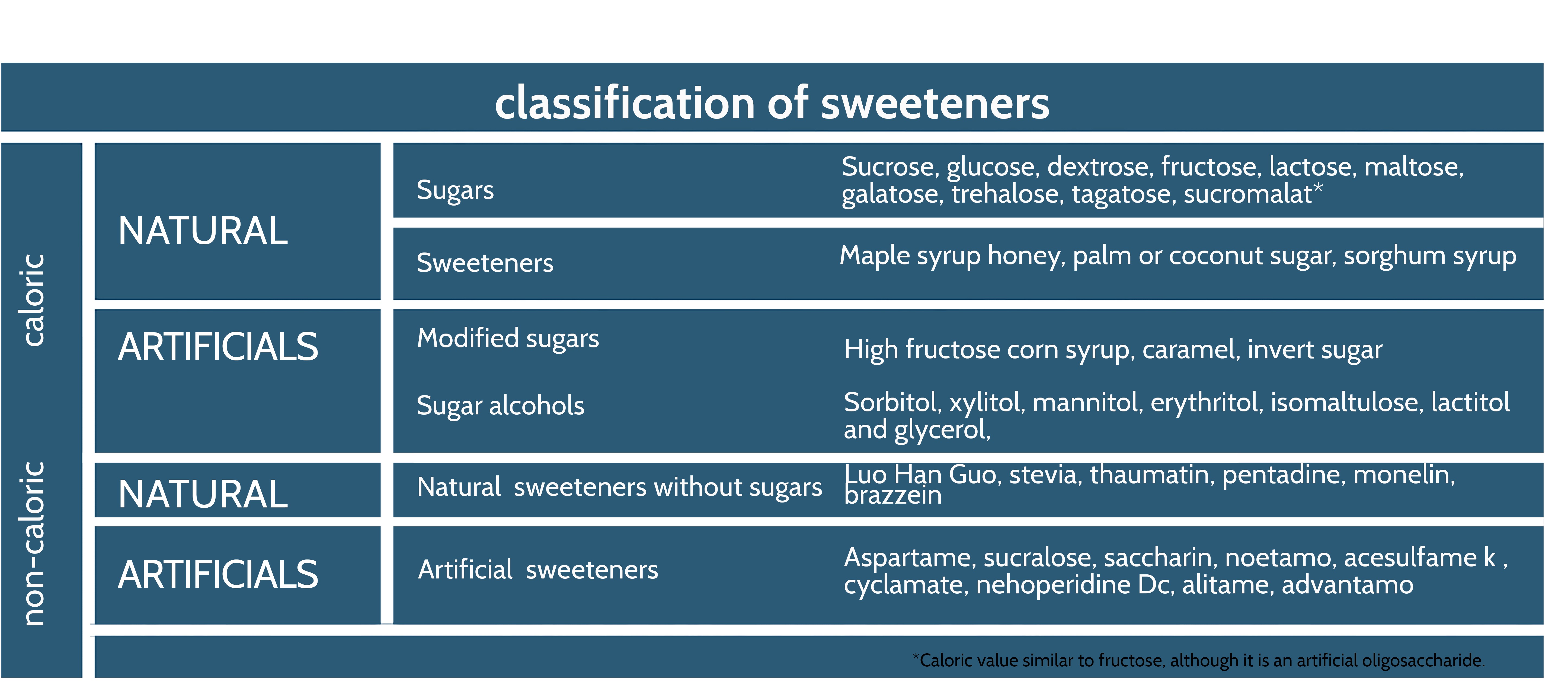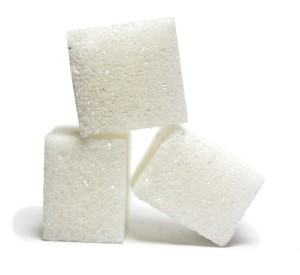Sweeteners, weight, diabetes and health: many doubts and few certainties
Caloric sweeteners have been proposed as a solution to a problem: the omnipresence of sugar. But their use today remains controversial because in addition to solving little or nothing, they may be the source of not a few problems.
 At this point we discover nothing to anyone if we say that the issue of involvement in the health of sweeteners is in the eye of the hurricane. Without going any further, this is a topic that has already passed through this particular blog with two consecutive posts that we published in 2016 (this one and this the second). Then we commented the shadows that from time to time hovered over the caloric substitutes of sugar or its derivatives. The shadows, in order to focus the topic well, did not allude to the classic fear that many times has been commented on its safety. In the classical sense, all authorized sweeteners are safe. The controversy about their problems refers to their ability to stimulate the increase of certain non-communicable diseases such as diabetes, weight gain, dysbiosis, etc. and other metabolic situations such as increased appetite. As a significant time has passed since 2016, we are going to see point by point and in a schematic way what science knows and what it does not know about these issues.
At this point we discover nothing to anyone if we say that the issue of involvement in the health of sweeteners is in the eye of the hurricane. Without going any further, this is a topic that has already passed through this particular blog with two consecutive posts that we published in 2016 (this one and this the second). Then we commented the shadows that from time to time hovered over the caloric substitutes of sugar or its derivatives. The shadows, in order to focus the topic well, did not allude to the classic fear that many times has been commented on its safety. In the classical sense, all authorized sweeteners are safe. The controversy about their problems refers to their ability to stimulate the increase of certain non-communicable diseases such as diabetes, weight gain, dysbiosis, etc. and other metabolic situations such as increased appetite. As a significant time has passed since 2016, we are going to see point by point and in a schematic way what science knows and what it does not know about these issues.

What is know n about the role of sweeteners in weight gain?
n about the role of sweeteners in weight gain?
Many observational, intervention and even some animal model studies have been done to study the relationship between sweetener consumption and weight status. With them in hand, the only conclusion we can draw… is that we cannot draw conclusions. I will explain, there are studies that show some results in one sense (that the consumption of sweeteners is associated with weight gain) and others in the opposite direction. Two interesting papers were published in 2017. For its part, a meta-analysis concluded: “Evidence from controlled clinical trials does not support the expected benefits of sweeteners in weight control, and data from observational studies suggest that routine intake of these non-caloric sweeteners may be associated with a higher Body Mass Index, as well as increased cardiometabolic risk. And on the other hand, a review with meta-analysis that summarized its findings as follows: “This study found two significant associations of both sugary soft drinks and sweetened soft drinks with obesity. Therefore, what we can take for granted is that we should not recommend the use of sweeteners as a valid weight loss strategy.
What is known about the role of sweeteners in increasing appetite?
 Years ago, some researchers affirmed that sweeteners could be an element that caused higher intakes, the explanation given is that the use of sweeteners decoupled the sensation of sweetness from the intake of calories (something evident in the use of sugar), and that this decoupling of sweet taste with the (not) inclusion of calories (typical of calorie sweeteners) would affect the mechanisms of appetite control and make people eat more. While the theory may have been true, recent studies have not been able to support it, and it is an idea that has been virtually discarded. As far as has been proven, the presence of sweeteners does not affect the appetite whether they are incorporated through caloric intakes.
Years ago, some researchers affirmed that sweeteners could be an element that caused higher intakes, the explanation given is that the use of sweeteners decoupled the sensation of sweetness from the intake of calories (something evident in the use of sugar), and that this decoupling of sweet taste with the (not) inclusion of calories (typical of calorie sweeteners) would affect the mechanisms of appetite control and make people eat more. While the theory may have been true, recent studies have not been able to support it, and it is an idea that has been virtually discarded. As far as has been proven, the presence of sweeteners does not affect the appetite whether they are incorporated through caloric intakes.
What is known about the role of sweeteners and the risk of type 2 diabetes?
This is another topic that has generated much debate and is that it will not be by chance, but the results of observational and intervention studies conducted to date are controversial. An interesting clinical trial regarding its methodology observed that the daily consumption of 2 cans of a drink containing aspartame and acesulfame K for 12 weeks did not show any significant effect on insulin sensitivity and secretion in non-diabetic adults. Very similar to, if not identical to, the results of this other clinical trial with aspartame instead of the previous sweeteners: “Aspartame taken twice daily for 12 weeks had no effect on blood glucose, appetite, or body weight among healthy, thin adults […]. In the field of meta-analysis of observational studies, this 2016 study shows the few certainties that exist in this field, its conclusions are anything but concrete:
The effects of sweeteners on glucose metabolism are not clear.The results of clinical trials are contradictory and are not comparable due to major differences between them.
The results of clinical trials are contradictory and are not comparable due to major differences between them. Studies evaluating specific sweeteners, with an adequate sample size, including a homogeneous study group, identifying significant co-morbidities, with an appropriate control group, with an appropriate exposure time, and considering adjustments for confounding variables such as adiposity, are needed.
Do sweeteners affect the intestinal flora in any way?
Since the beginning of the century, although with more intensity in the last decade, the study of intestinal microbiome alterations has been postulated as an element that can affect different health conditions, from weight, to diabetes and certain moods such as anxiety (among others). However, and in spite of the incessant background rumors referring to studies that claim to have found this or that relationship, there is nothing that can be given for certain or discarded in the way in which sweeteners can alter the health of the intestinal microbiote.
Do sweeteners affect the intestinal flora in any way?
Since the beginning of the century, although with more intensity in the last decade, the study of intestinal microbiome alterations has been postulated as an element that can affect different health conditions, from weight, to diabetes and certain moods such as anxiety (among others). However, and in spite of the incessant background rumors referring to studies that claim to have found this or that relationship, there is nothing that can be given for certain or discarded in the way in which sweeteners can alter the health of the intestinal microbiomes.
study of intestinal microbiome alterations has been postulated as an element that can affect different health conditions, from weight, to diabetes and certain moods such as anxiety (among others). However, and in spite of the incessant background rumors referring to studies that claim to have found this or that relationship, there is nothing that can be given for certain or discarded in the way in which sweeteners can alter the health of the intestinal microbiomes.
Other considerations
It is essential to mention that independently of the previous reflections there is a specific group of patients, those who suffer from phenylketonuria (congenital alteration of the metabolism caused by the lack of the enzyme phenylalanine hydroxylase), who have to avoid at all costs the use of a specific sweetener, is aspartame. The reason is that aspartame is composed of two amino acids: aspartic acid and phenylalanine. Specifically, it is this last amino acid whose control is decisive in this class of patients and, therefore, they must avoid it.
Finally, it should be noted that it is possible to isolate certain sweeteners (in particular saccharin, sucralose and acesulfamo-k, but not aspartame) in breast milk (obviously in those mothers who had previously eaten food with these sweeteners). Although the possible consequences of this finding have not yet been determined, this should be considered in order to warn breastfeeding mothers.
Latest posts by Juan Revenga Frauca (see all)
- Obesity recognized as a chronic disease - 13 October, 2021
- Who said you have to eat everything? - 7 October, 2021
- Diabetes and Alzheimer - 29 January, 2021








